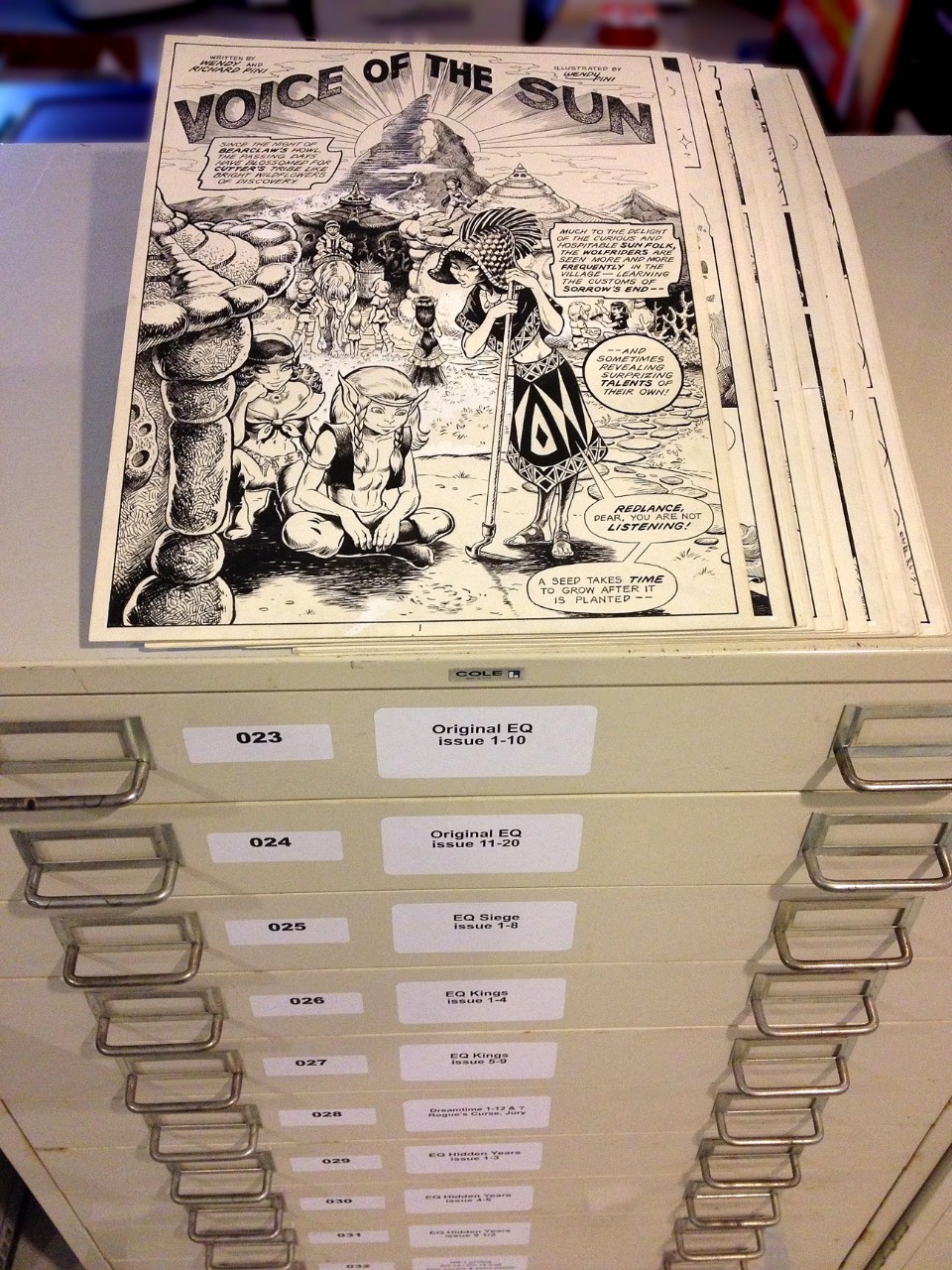Columbia University Libraries Acquires Elfquest Comic Archives
 Page 1, the "splash page," from issue #5 of the original Elfquest series, 1979.
Page 1, the "splash page," from issue #5 of the original Elfquest series, 1979.
This acquisition is the latest development in Columbia University Libraries’ support for the research and teaching of comics and graphic novels. Since 2005, a circulating collection of such materials, developed by librarian Karen Green, has inspired scholarly inquiry, as well as academic writing and coursework, including The American Graphic Novel, a course co-taught by Columbia University Professor Jeremy Dauber and former DC Comics president Paul Levitz.
Materials in the collection include every piece of original art from ElfQuest; including original art boards and pages from the comic book series, which was largely self-published by the Pinis. Over time, Elfquest was also published by Marvel Comics, and more recently DC Comics. Unlike many comic artists whose work originated in pre-digital eras and who chose to sell original pages, the Pinis maintained their own complete archive of Wendy’s Elfquest artwork.
"At first, the decision to hang on to every page of Wendy's Elfquest art was mostly a commercial one; we never knew when we might need the original boards for reprinting. There was also an emotional component. I remembered the long hours Wendy put in, the editorial debates we had, the shared joy of seeing exactly the right expression on a character's face,” said Richard Pini. “Now that we have high-quality digital scans of it all, we're honored to donate the entire archive to Columbia.”
Elfquest material was first published in spring of 1978 in Fantasy Quarterly, an underground comic book that folded shortly thereafter. The Pinis then founded WaRP Graphics, a company that sought to produce higher quality publications to better showcase Wendy’s black and white and full color artwork. The series also serves as the basis for several volumes of prose fiction.
“This collection is particularly important because of its key role in the establishment of a highly visible phase of alternative, independent comic books and also its creative direction by a female artist,” said Karen Green, Graphic Novels Librarian at Columbia University. “One of Columbia’s areas of strength in special collections is the history of publishing, and ElfQuest represents a significant milestone in the history of self-published comics. It is also, perhaps, the earliest example of the influence of manga on American comic art.”
Other materials in the Pinis’ archives include original art from an unrealized animated adaptation of Michael Moorcock’s fantasy novel Stormbringer and from a graphic novel adaptation of The Masque of the Red Death; drafts of scripts and novelizations; copies of each edition of the ElfQuest graphic novels; fanzines created by both the Pinis and their fans; correspondence, contracts, and legal records; and the design for Wendy Pini’s Red Sonja cosplay costume.
“Wendy and Richard Pini helped create something extraordinary both as artists and business people,” according to Larry Marder, creator of the independent comic Beanworld and former Executive Director of Image Comics. “They served as an inspiration to several generations of comics creators. I’m so glad to learn that their papers and archives will be part of the Columbia University library and will be available to historians and scholars in the decades to come.”
The archives will arrive at Columbia Libraries in several stages, with the first phase including a complete set of all the Elfquest comics published, a complete set of all the Elfquest books and collections, and the original artwork to all twenty issues of the original Warp Graphics editions (1978-1984). For more information about Columbia University Libraries’ Comics Graphic Novels Collections, please visit the website.
"One hesitates to use words like ‘groundbreaking’ when discussing early graphic novels, but ElfQuest remains one of the handful of books that deserves that term,” said Steve Weiner, author of Faster than a Speeding Bullet: the Rise of the Graphic Novel and co-author of The Will Eisner Companion. “This series was the first to move out of the comic book marketplace and into bookstores, paving the way for the growth of the graphic novel both as art form and a vehicle for popular culture."
Columbia University Libraries/Information Services is one of the top five academic research library systems in North America. The collections include over 11 million volumes, over 150,000 journals and serials, as well as extensive electronic resources, manuscripts, rare books, microforms, maps, and graphic and audio-visual materials. The services and collections are organized into 22 libraries and various academic technology centers. The Libraries employs more than 500 professional and support staff. The website of the Libraries is the gateway to its services and resources: library.columbia.edu.